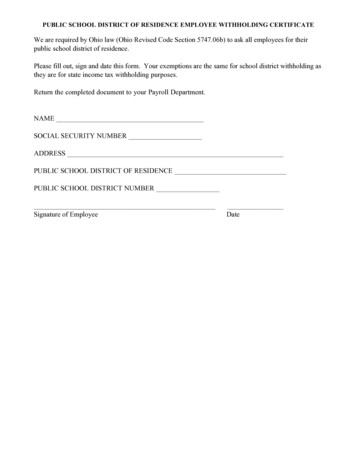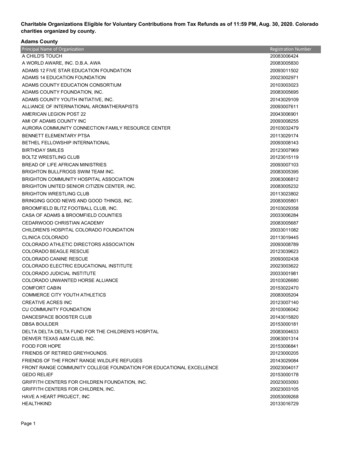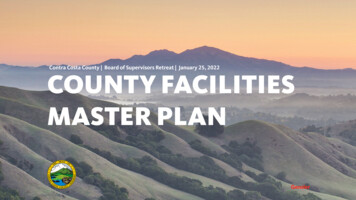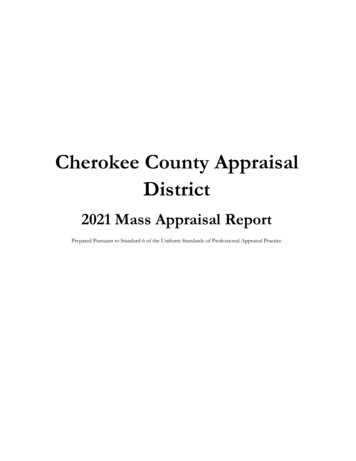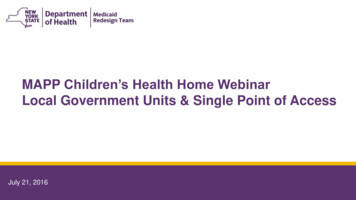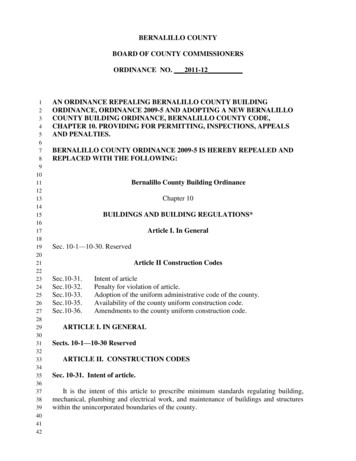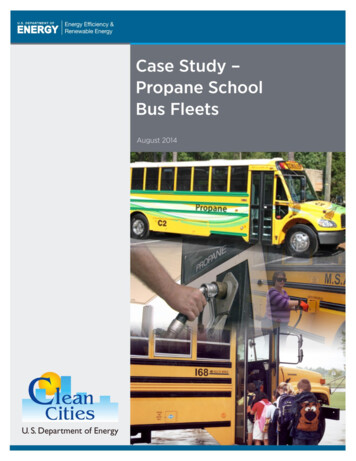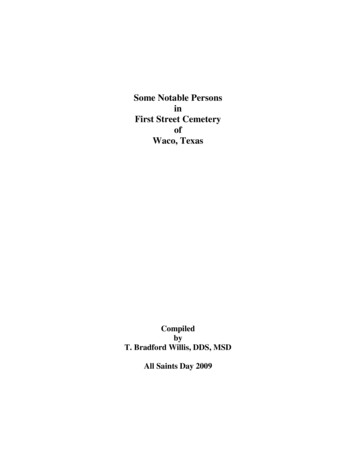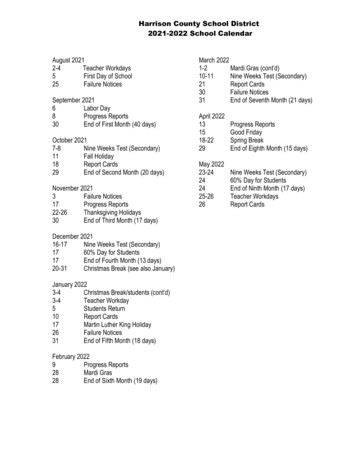
Transcription
Harrison County School District2021-2022 School CalendarAugust 20212-4Teacher Workdays5First Day of School25Failure NoticesSeptember 20216Labor Day8Progress Reports30End of First Month (40 days)October 20217-8Nine Weeks Test (Secondary)11Fall Holiday18Report Cards29End of Second Month (20 days)November 20213Failure Notices17Progress Reports22-26Thanksgiving Holidays30End of Third Month (17 days)December 202116-17Nine Weeks Test (Secondary)1760% Day for Students17End of Fourth Month (13 days)20-31Christmas Break (see also January)January 20223-4Christmas Break/students (cont’d)3-4Teacher Workday5Students Return10Report Cards17Martin Luther King Holiday26Failure Notices31End of Fifth Month (18 days)February 20229Progress Reports28Mardi Gras28End of Sixth Month (19 days)March 20221-2Mardi Gras (cont’d)10-11Nine Weeks Test (Secondary)21Report Cards30Failure Notices31End of Seventh Month (21 days)April 2022131518-2229Progress ReportsGood FridaySpring BreakEnd of Eighth Month (15 days)May 202223-24242425-2626Nine Weeks Test (Secondary)60% Day for StudentsEnd of Ninth Month (17 days)Teacher WorkdaysReport Cards
HARRISON COUNTY SCHOOL DISTRICT2021-2022 QUICK REFERENCE CALENDARGRADING PERIODSFIRST TERM August 5, 2021 – October 8, 2021 (46 Days)SECOND TERM October 11, 2021 – December 17, 2021 (44 Days)THIRD TERM January 5, 2022-March 11, 2022 (44 Days)FOURTH TERM March 14, 2022-May 24, 2022 (46 Days)TERM TESTSFIRST TERM (SECONDARY) October 7-8, 2021SECOND TERM (SECONDARY) December 16-17, 2021THIRD TERM (SECONDARY) March 10-11, 2022FOURTH TERM (SECONDARY) May 23-24, 2022PROGRESS REPORTSSeptember 8, 2021November 17, 2021February 9, 2022April 13, 2022REPORT CARD DATESOctober 18, 2021January 10, 2022March 21, 2022May 26, 2022HOLIDAYSLabor Day – September 6, 2021Fall Holiday – October 11, 2021Thanksgiving Holiday – November 22-26, 202160% Day for Students – December 17, 2021Christmas Holidays – December 20, 2021-January 4, 2022**(students)January 3, 2022**teachers return and students return on January 5, 2022Martin Luther King Day – January 17, 2022Mardi Gras –February 28-March 2, 2022Good Friday –April 15, 2022Spring Break – April 18-22, 202260% Day for Students – May 24, 2022SPECIAL WORKDAYSTeacher WorkdayAugust 2-4, 2021 (3 days)January 3-4, 2022 (2 days)May 25-26, 2022 (2 days)Teacher Assistant WorkdaysAugust 3-4, 2021May 25-26, 2022
School CalendarForewordSuperintendent’s MessageAdministrationBoard of Education, Message from School BoardDirectorsHarrison County School District Mission Statement & Belief StatementsHistory of the Harrison County School DistrictCode of EthicsAccidentsAccounting ProceduresAddress/TelephoneAnnual, YearbookArrest of EmployeeAsbestos PolicyAssignment to SchoolsAttendance (Teacher)Attendance (Secondary Students Grades 7-8, 9-12)Attendance (Grades 1-8)Bed BugsBullyingCare of ClassroomCell Phones, Audio Video RecordingChild Nutrition PolicyCode of Conduct/StudentsCode of Ethics/Standards of ConductCode of Ethics Employee AgreementCommunicable DiseasesCompliance Policies – ConfidentialityConduct on Virtual MeetingConferencesCopyright of Instructional MaterialsCumulative Records: The Preparation and UsageDirectory InformationDisciplineDiscipline GuideDrug Abuse Policy for s of TeachersEEFEmergenciesEmployee Account AgreementEmployee/Student/or Other Third-Party InjuryEnglish LearnerExam Exemption Policy (Secondary)Failure Notices/Progress ReportsFamily & Medical Leave ActFederal ProgramsFeesField TripsFire & Severe Weather DrillsFixed AssetsFoster CareGradingGrievance Procedure (Certified Personnel)Homebound InstructionHomeless ChildrenHomeworkHouse Bill 527IllnessesIncentive 536763636-3839139404040407445414345454644465646
Jury DutyLeaveLesson PlansLiabilityLicensureMCCRS/Grouping PolicyMid-Year PromotionMilitary/IHL RecruitmentSchool Policy for the Administration of MedicineHCSD Policy & Procedures for Reporting Abuse or NeglectOnline Grading SystemOutside EmploymentParents’ Right to Know PolicyPartiesPayroll InformationPersonnel AppraisalProfessional DevelopmentPromotion & RetentionProperty/EquipmentReduction in Force (Lay-Off)Report CardsResource PersonsSafetySearch & SeizureSex EducationSexual HarassmentSocial NetworkingSpecial ProgramsStudent Religious Liberties Act of 2013Student TeachersSubstitute TeachersSuicide Prevention In-Service TrainingSurveillance SystemsTeacher AssistantsMulti-Tiered System (MTS)TechnologyTesting TransparencyTextbooksThreats & Violence (Workplace)Title I Family Engagement OverviewTitle IXTobacco Use PolicyTransfers/Non-Accredited SchoolsUnlawful ActivityVisitorsWeaponsWebsiteWellness PolicyWithdrawal ProceduresWorkers CompensationWork 7071727331727274
FOREWORDThe administrative procedures contained within this handbook are designed to guide youthrough this school year. Retain this handbook and place all future bulletins in it for yourreference.SUPERINTENDENT’S MESSAGEHarrison County School District is committed to excellence by focusing on each individual studentand providing exemplary instruction. Our schools serve unique communities that encompass bothrural and urban neighborhoods.We have created a culture of teaching and learning that starts with students’ earliest entrance intoour programs and follows them throughout their school years. At the earliest levels of our students’education, we partner with private educational agencies in the area of pre-K curricula and studentpreparation. We recognize that a well-rounded education inspires students and encourages theirindividual talents. As students progress through our system, we fully support their pursuits ofextra-curricular activities such as band, athletics, fine arts, computer science, and robotics.Our rigorous instruction includes accelerated classes in all schools. We offer a variety of dualcredit and advanced-placement classes that allow students to earn college credits while attendinghigh school.Our flexible course offerings accommodate both college-bound and career-bound students.Students may earn industry certification at the high school level that will allow them to pursue acareer immediately after graduation. Our district offers graduation tracks that are traditional andearly exit.We support our faculty and district employees by providing continual high-quality professionaldevelopment and learning opportunities.As superintendent, I am proud to be a part of a team that is dedicated to caring for and educatingour communities and the world’s next generation of workers, leaders, and stewards of the future.Mitchell KingSuperintendent of EducationADMINISTRATIONMitchell King . . Superintendent of Education. . Assistant SuperintendentBOARD OF EDUCATIONDistrict I. .Rena WigginsDistrict II . . .Tom DanielsDistrict III . . .David LadnerDistrict IV . .Dr. Barbara ThomasDistrict V . . Eric Simmons
MESSAGE FROM THE SCHOOL BOARD PRESIDENTDear HCSD Stakeholders,It is with high esteem that I welcome back our students, parents, school level administrators andtheir staff, and all district level employees! Although, the 2020-2021 school year was anothersuccessful year for our students academically, the pandemic presented many challenges.However, we were able to navigate through the challenges because of our great students,wonderful parents and all of the outstanding Harrison County School District instructional andsupport staff. There are not enough words to express the depth of my gratitude for all of you andthe supportive community that surrounds us.As I join all of you in looking forward to the excitement and successes this school year will bring,I am happy to announce the opening of a new middle school, West Harrison Middle School, andthe newly restructured North Gulfport Elementary/Middle School. I am confident our staff willcontinue the delivery of educational excellence for all of our students with the goal of providingthe skills and tools our students need to be successful in our global society. This goal willcontinue to be our beacon of light as we progress through this year.Best Regards,Dr. Barbara J. ThomasSchool Board PresidentDIRECTORSAverie Bush, Athletics 539-6509Brad Barlow, R.D. Child Nutrition . 539-7231Dorene Hansen, Curriculum and Accountability . 539-6234Melissa Garrison, Federal Programs 831-5328Tad Shaw, Transportation Supervisor . 832-4107Eddie Slade, Maintenance Supervisor 832-4107Shelia Curtis, Special Education 832-9344Dr. Laretta Marks, Student Services 539-7229Mike Valdez, Technology 539-1849Cathy Garner, Security and Internal Compliance 539-6538District Administration Office 539-6500
EDUCATIONAL PHILOSOPHY AND BELIEF STATEMENTSOF THE HARRISON COUNTY SCHOOL DISTRICTMISSION STATEMENTHarrison County School District is committed to providing a healthy, safe, and caring learningenvironment that is dedicated to quality instruction. Through high expectations and academicexcellence, students will be productive citizens, empowered leaders, and lifelong learners.HISTORY OF THE HARRISON COUNTY SCHOOL DISTRICTThe Harrison County School District was created in 1957 as a result of a statewidereorganization placed into law by the Mississippi legislature. Districts coming together to formthe new district were Pineville, Lyman, Orange Grove, Turkey-Creek, North Gulfport,Woolmarket, D’Iberville, Saucier, Lizana and part of the Dedeaux and Sellers districts.The district has grown rapidly and is today one of the largest in Mississippi, both in size of areait serves and in the number of pupils enrolled. Today the district consists of twenty-two schools.All procedures, Mississippi Codes, Mississippi Public School Accountability Standards forenactment of policy and procedures are available online through links provided on the HarrisonCounty School District website. http://harrison.msbapolicy.org/
CODE OF ETHICSWe, the educators of the Harrison County School District, acknowledge the challenges of theprofession we have chosen and engage ourselves, individually and collectively, to assess ourcolleagues and to be assessed by them in accordance with applicable provisions of this code.PRINCIPLE I: Commitment to the StudentWe affirm our belief in the worth and dignity of humanity. We recognize the supreme importanceof the pursuit of truth, the encouragement of scholarship, and the promotion of democraticcitizenship. We regard these goals to be essential to the protection of freedom to learn and theguarantee of equal education opportunity for all. We affirm and accept our responsibility topractice our profession according to the highest ethical standards. In fulfilling our obligations tothe student, we: Deal justly and considerately with each student. Encourage the student to study varying points of view and to respect his/her right to formhis/her own judgment. Withhold confidential information about the home of a student unless we deem the releaseserves professional purposes, and will benefit the student, or the release is required by law. Conduct conferences in an appropriate place and manner. Avoid exploiting our professional relationship with any student. Tutor in accordance with officially approved policies. Inform appropriate individuals and agencies of the educational needs of the student andassist in providing an understanding of the educational experiences of the student. Seek constantly to improve learning facilities and opportunities.PRINCIPLE II: Commitment to the CommunityWe believe that patriotism in the highest form requires dedication to the principles of ourdemocratic heritage. We share the responsibility for the development of sound public policy withother citizens. We are particularly accountable for participating in the development ofeducational programs and policies and for interpreting them to the public. In fulfilling ourobligations to the community, we: Share the responsibility for improving the educational opportunities for all. Recognize that each educational institution may have a person authorized to interpret theofficial policies. Acknowledge the right and responsibility of the public to participate in the formulation ofeducational policy. Use educational facilities for intended purposes consistent with applicable policy, law, andregulations. Assume full potential and citizenship responsibilities, but refrain from exploiting theinstitutional privileges or professional positions to promote political candidates or partisanactivities. Protect the educational program against undesirable infringement.PRINCIPLE III: Commitment to the ProfessionWe believe that the quality of the services of the educational profession directly influence thefuture of the nation and its citizens. We therefore exert every effort to raise educationalstandards, to improve our services, to promote a climate in which the exercise of professionaljudgment is encouraged, and to achieve conditions that attract persons worthy of the trust tocareers in education. Aware of the value of united effort, we actively support the plans andprograms of our profession. In fulfilling our obligations to the profession, we:
Recognize that a profession must accept responsibility for the conduct of its members andunderstand that the conduct may be representative of the profession.Participate and conduct ourselves in a responsible manner in the development andimplementation of policies affecting education.Cooperate in the orientation of student teachers, interns, and those colleagues new to theirpositions.Refrain from assigning professional duties to non-professional personnel when suchassignments are not in the best interest of the student.Keep the trust under which confidential information is exchanged.Interpret and use the writing of others and the finding of educational research withintellectual honesty.Maintain the integrity of the profession when dissenting by basing public criticism ofeducation on valid assumptions as established by careful evaluation of facts.Represent our professional qualifications honestly and identify ourselves only with reputableeducational institutions.Respond accurately to requests for evaluations of colleagues.Provide job-seeking applicants with an honest description of the assignment, the conditionsof work, and related matters.PRINCIPLE IV: Commitment to Professional Employment PracticesWe regard the employment agreement as a solemn pledge to be executed both in the spirit andin fact and in a manner consistent with the highest ideals of professional service. Soundprofessional personnel relationships with a governing board are built upon personal integrity,dignity, and mutual respect. In fulfilling our obligations to professional employment practices,we: Apply for or offer a position on the basis of professional and legal qualifications. Apply for a specific position only when it is known to be vacant and refrain from suchpractices as underbidding or commenting adversely about other candidates. Fill no vacancy except where the terms, conditions, policies, and practices permit theexercise of our professional judgment and skill, and where a climate conducive toprofessional service exists. Adhere to the conditions of contract or to the terms of an appointment until either has beenterminated legally or by mutual consent. Give prompt notice of any change in the availability of service, in status of application, orchange of position. Conduct professional business through the recognized educational and professionalchannels. Accept no gratuities or gifts of significance that might influence our judgment in the exerciseof our professional duties. Engage in no outside employment that will impair the effectiveness of our professionalservice and permit no commercial exploitation of our professional position.CODE OF ETHICS AND STANDARDS OF CONDUCT - STATE BOARD POLICYMississippi Educator Code of Ethics and Standards of ConductEach educator, upon entering the teaching profession, assumes a number of obligations, one ofwhich is to adhere to a set of principles which defines professional conduct. These principlesare reflected in the following code of ethics which sets forth to the education profession and thepublic it serves standards of professional conduct and procedures for implementation.
This code shall apply to all persons licensed according to the rules established by theMississippi State Board of Education and protects the health, safety and general welfare ofstudents and educators.Ethical conduct is any conduct which promotes the health, safety, welfare, discipline and moralsof students and colleagues.Unethical conduct is any conduct that impairs the license holder’s ability to function in his/heremployment position or a pattern of behavior that is detrimental to the health, safety, welfare,discipline, or morals of students and colleagues.Any educator or administrator license may be revoked or suspended for engaging inunethical conduct relating to an educator/student relationship (Standard4). Superintendents shall report to the Mississippi Department of Education licenseholders who engage in unethical conduct relating to an educator/student relationship(Standard 4).Code of Ethics StandardsStandard 1: Professional ConductAn educator should demonstrate conduct that follows generally recognized professionalstandards.1.1. Ethical conduct includes, but is not limited to, the following:a. Encouraging and supporting colleagues in developing and maintaining high standardsb. Respecting fellow educators and participating in the development of a professionalteaching environmentc. Engaging in a variety of individual and collaborative learning experiences essential toprofessional development designed to promote student learningd. Providing professional education services in a nondiscriminatory mannere. Maintaining competence regarding skills, knowledge, and dispositions relating to his/herorganizational position, subject matter and pedagogical practicesf. Maintaining a professional relationship with parents of students and establishappropriate communication related to the welfare of their children.1.2. Unethical conduct includes, but is not limited to, the following:a. Harassment of colleaguesb. Misuse or mismanagement of tests or test materialsc. Inappropriate language on school grounds or any school-related activityd. Physical altercationse. Failure to provide appropriate supervision of students and reasonable disciplinaryactions.Standard 2. TrustworthinessAn educator should exemplify honesty and integrity in the course of professionalpractice and does not knowingly engage in deceptive practices regarding official policiesof the school district or educational institution.2.1. Ethical conduct includes, but is not limited to, the following:
a. Properly representing facts concerning an educational matter in direct or indirect publicexpressionb. Advocating for fair and equitable opportunities for all childrenc. Embodying for students the characteristics of honesty, diplomacy, tact, and fairness.2.2. Unethical conduct includes, but is not limited to, the following:a. Falsifying, misrepresenting, omitting, or erroneously reporting any of the following:1. employment history, professional qualifications, criminal history,certification/recertification2. information submitted to local, state, federal, and/or other governmental agencies3. information regarding the evaluation of students and/or personnel4. reasons for absences or leave5. information submitted in the course of an official inquiry or investigationb. Falsifying records or directing or coercing others to do so.Standard 3. Unlawful ActsAn educator shall abide by federal, state, and local laws and statutes and local schoolboard policies.3. Unethical conduct includes, but is not limited to, the commission or conviction of a felony orsexual offense. As used herein, conviction includes a finding or verdict of guilty, or a plea of nolocontendere, regardless of whether an appeal of the conviction has been sought or situationwhere first offender treatment without adjudication of guilt pursuant to the charge was granted.Standard 4. Educator/Student RelationshipAn educator should always maintain a professional relationship with all students, both inand outside the classroom.4.1. Ethical conduct includes, but is not limited to, the following:a. Fulfilling the roles of mentor and advocate for students in a professional relationship. Aprofessional relationship is one where the educator maintains a position ofteacher/student authority while expressing concern, empathy, and encouragement forstudentsb. Nurturing the intellectual, physical, emotional, social and civic potential of all studentsc. Providing an environment that does not needlessly expose students to unnecessaryembarrassment or disparagementd. Creating, supporting, and maintaining a challenging learning environment for allstudents.4.2. Unethical conduct includes, but is not limited to the following:a. Committing any act of child abuseb. Committing any act of cruelty to children or any act of child endangermentc. Committing or soliciting any unlawful sexual actd. Engaging in harassing behavior on the basis of race, gender, national origin, religion ordisabilitye. Furnishing tobacco, alcohol, or illegal/unauthorized drugs to any student or allowing astudent to consume alcohol or illegal/unauthorized drugsf. Soliciting, encouraging, participating or initiating inappropriate written, verbal, electronic,physical or romantic relationship with a student.Examples of these acts may include but not be limited to:
1. sexual jokes2. sexual remarks3. sexual kidding or teasing4. sexual innuendo5. pressure for dates or sexual favors6. inappropriate touching, fondling, kissing or grabbing7. rape8. threats of physical harm9. sexual assault10. electronic communication such as texting11. invitation to social networking12. remarks about a student’s body13. consensual sexStandard 5. Educator Collegial RelationshipsAn educator should always maintain a professional relationship with colleagues, both inand outside the classroom.5. Unethical conduct includes but is not limited to the following:a. Revealing confidential health or personnel information concerning colleagues unlessdisclosure serves lawful professional purposes or is required by lawb. Harming others by knowingly making false statements about a colleague or the schoolsystemc. Interfering with a colleague’s exercise of political, professional, or citizenship rights andresponsibilitiesd. Discriminating against or coercing a colleague on the basis of race, religion, nationalorigin, age, sex, disability or family status Using coercive means or promise of specialtreatment in order to influence professional decisions of colleagues.e. Using coercive means or promise of special treatment in order to influence professionaldecisions of colleagues.Standard 6. Alcohol, Drug and Tobacco Use or PossessionAn educator should refrain from the use of alcohol and/or tobacco during the course ofprofessional practice and should never use illegal or unauthorized drugs.6.1. Ethical conduct includes, but is not limited to, the following:a. Factually representing the dangers of alcohol, tobacco and illegal drug use and abuse tostudents during the course of professional practice.6.2. Unethical conduct includes, but is not limited to, the following:a. Being under the influence of, possessing, using, or consuming illegal or unauthorizeddrugsb. Being on school premises or at a school-related activity involving students whiledocumented as being under the influence of, possessing, or consuming alcoholicbeverages. A school-related activity includes but is not limited to, any activity that issponsored by a school or a school system or any activity designed to enhance theschool curriculum such as club trips, etc. which involve students.c. Being on school premises or at a school-related activity involving students whiledocumented using tobacco.
Standard 7. Public Funds and PropertyAn educator shall not knowingly misappropriate, divert, or use funds, personnel,property, or equipment committed to his or her charge for personal gain or advantage.7.1. Ethical conduct includes, but is not limited to, the following:a. Maximizing the positive effect of school funds through judicious use of said fundsb. Modeling for students and colleagues the responsible use of public property.7.2. Unethical conduct includes, but is not limited to, the following:a. Knowingly misappropriating, diverting or using funds, personnel, property or equipmentcommitted to his or her charge for personal gainb. Failing to account for funds collected from students, parents or any school-relatedfunctionc. Submitting fraudulent requests for reimbursement of expenses or for payd. Co-mingling public or school-related funds with personal funds or checking accountse. Using school property without the approval of the local board of education/governingbody.Standard 8. Remunerative ConductAn educator should maintain integrity with students, colleagues, parents, patrons, orbusinesses when accepting gifts, gratuities, favors, and additional compensation.8.1 Ethical conduct includes, but is not limited to, the following:a. Insuring that institutional privileges are not used for personal gainb. Insuring that school policies or procedures are not impacted by gifts or gratuities fromany person or organization.8.2. Unethical conduct includes, but is not limited to, the following:a. Soliciting students or parents of students to purchase equipment, supplies, or servicesfrom the educator or to participate in activities that financially benefit the educator unlessapproved by the local governing bodyb. Tutoring students assigned to the educator for remuneration unless approved by thelocal school boardc. The educator shall neither accept nor offer gratuities, gifts, or favors that impairprofessional judgment or to obtain special advantage. (This standard shall not restrictthe acceptance of gifts or tokens offered and accepted openly from students, parents, orother persons or organizations in recognition or appreciation of service.)Standard 9. Maintenance of ConfidentialityAn educator shall comply with state and federal laws and local school board policiesrelating to confidentiality of student and personnel records, standardized test material,and other information covered by confidentiality agreements.9.1. Ethical conduct includes, but is not limited to, the following:a. Keeping in confidence information about students that has been obtained in the courseof professional service unless disclosure serves a legitimate purpose or is required bylawb. Maintaining diligently the security of standardized test supplies and resources.
9.2. Unethical conduct includes, but is not limited to, the following:a. Sharing confidential information concerning student academic and disciplinary records,health and medical information family status/income and assessment/testing resultsunless disclosure is required or permitted by law.b. Violating confidentiality agreements related to standardized testing including copying orteaching identified test items, publishing or distributing test items or answers, discussingtest items, and violating local school board or state directions for the use of testsc. Violating other confidentiality agreements required by state or local policy.Standard 10. Breach of Contract or Abandonment of EmploymentAn educator should fulfill all of the terms and obligations detailed in the contract with thelocal school board or educational agency for the duration of the contract.10. Unethical conduct includes, but is not limited to, the following:a. Abandoning the contract for professional services without prior release from the contractby the school boardb. Refusing to perform services required by the contract.ACCIDENTSAll personnel should be familiar with the emergency plan for their particular campus, and thisprocedure should be followed as closely as possible; however, no procedure can be preformulated and be completely applicable in all situations. The following is provided for generalguidance and should be modified as the situation demands:1. Remain calm, take charge, and determine what action is needed.2. Act decisively. If the situation is serious, send for help from the office.3. If first aid is indicated and if you are knowledgeable, administer first aid.4. Resume normal activities as soon as possible.5. A report prepared or completed by the principal must be submitted to the office prior to theend of the school day for all accidents. A copy of the report should be submitted to thedistrict safety supervisor.ACCOUNTING PROCEDURESAll monies collected by the teacher shall be receipted, using a receipt provided by the principal.Strictest care must be taken in the handling of these funds. The following points are to beadhered:1. Any collection of money must receive prior approval of the principal.2. All money should be receipted when colle
21 Report Cards 30 Failure Notices 31 End of Seventh Month (21 days) April 2022 13 Progress Reports 15 Good Friday 18-22 Spring Break 29 End of Eighth Month (15 days) May 2022 23-24 Nine Weeks Test (Secondary) 24 60% Day for Students 24 End of Ninth Month (17
